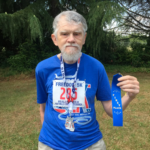 Yesterday, as I do every day, I collected our mail from our mailbox at the end of our driveway. I didn’t look at it. I just carried it into the house so my wife could wipe it off with a sanitizing wipe. Thanks, COVID-19 for providing some unneeded hassle! Anyway, my wife, Joyce, read the envelopes and discovered that some were addressed to people she didn’t know.
Yesterday, as I do every day, I collected our mail from our mailbox at the end of our driveway. I didn’t look at it. I just carried it into the house so my wife could wipe it off with a sanitizing wipe. Thanks, COVID-19 for providing some unneeded hassle! Anyway, my wife, Joyce, read the envelopes and discovered that some were addressed to people she didn’t know.
They were for the White family, who live up the street, on the other side. She didn’t know these people, but she did know the people who had lived in that house before. I tried to tell her the name of the former residents, to identify the house to her, but I couldn’t call it up. I tried really hard, but to no avail.
That was frustrating, but I went about my business until today when I took my usual two-mile run. While I was running, I was going over the problem in my mind. Suddenly, after a couple of associations, the name of the family that used to live up the street on the other side popped into my mind.
Why could I not recall that family’s name yesterday, but today when I was running, it came to me. I don’t know if my recall problems are due to “normal aging” or to an early stage of Alzheimer’s disease or some other type of dementia. It’s disconcerting, whatever it is. However, might it be that the fact that I was running when the answer came to me, had the effect of enhancing my ability to recall a fact? A recent study, conducted by researchers at the University of Texas Southwestern, addresses this very question.
 The hypothesis that motivated the study was that exercise increases blood flow to the brain and that increased blood flow to key areas of the brain would enhance memory. The researchers recruited thirty test subjects, aged 60 and above, who were having memory problems. Half of these people were put on an aerobic exercise program for a period of twelve months. The other fifteen people were put on a twelve-month program of stretching exercises.
The hypothesis that motivated the study was that exercise increases blood flow to the brain and that increased blood flow to key areas of the brain would enhance memory. The researchers recruited thirty test subjects, aged 60 and above, who were having memory problems. Half of these people were put on an aerobic exercise program for a period of twelve months. The other fifteen people were put on a twelve-month program of stretching exercises.
Memory tests as well as brain images were taken of all participants, at both the beginning and the end of the twelve-month study. Both the memory tests and the brain images told an exciting story.
- The aerobic exercise group experienced a 47% improvement above baseline in memory score
- The stretching exercise group experienced negligible change in memory score
- The brain scans of the aerobic exercise group showed increased blood flow to the anterior cingulate cortex and the hippocampus, both of which are important to memory
- The brain scans of the stretching group did not show increased blood flow to those areas
As of today, there is no known treatment that is effective in preventing, curing, or just slowing down Alzheimer’s disease and other dementias. This study offers hope that aerobic exercise may be the first intervention that has a positive effect on the problem. Clearly, larger studies are called for. In the meantime, I think I’ll be continuing my running habit. Maybe I’ll even bump it up to three miles a day.
BIO:
Allen G. Taylor is a 40-year veteran of the computer industry and the author of over 40 books, including Develop Microsoft HoloLens Apps Now, Get Fit with Apple Watch, Cruise for Free, SQL For Dummies, 9th Edition, Crystal Reports 2008 For Dummies, Database Development For Dummies, Access Power Programming with VBA, and SQL All-In-One For Dummies, Third Edition. He lectures internationally on astronomy, databases, innovation, and entrepreneurship. He also teaches database development and Crystal Reports through a leading online education provider. For the latest news on Allen’s activities, check out his blog at wwwallengtaylor.com or contact him at allen.taylor@ieee.org.